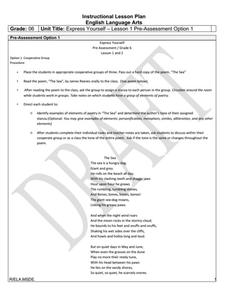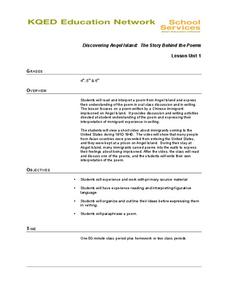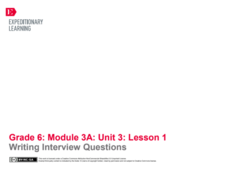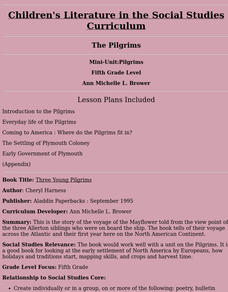Scholastic
Using Poetry to Explore Change and Belonging
Change, growth, and a sense of belonging are the focus of a unit that uses poetry to explore these themes and the distinguishing features of poetry as well.
Core Knowledge Foundation
Sixth Grade Poetry
Study some of the most prominent poets and works of poetry in history with a language arts poetry unit. From Virgil to Shakespeare to Dickinson to Angelou, the resources present biographies and examples of poetic elements to the sixth...
National Park Service
The Poet's Toolbox
If you need a lesson for your poetry unit, use two poems by Henry Wadsworth Longfellow ("Rain in Summer" and "The Slave in the Dismal Swamp") and a resource on Elements of Poetry. The lesson plan guides you through activities on...
EngageNY
Writing, Critique, and Revising: Two-Voice Poems (Chapter 14: "Las Ucas/Grapes")
Continue work on the two-piece poem that compares two characters from Esperanza Rising. Give class members a few minutes to finish their drafts. After they have a complete product, model how to critique and edit the poems with one group....
Curated OER
Word Association Poetry with Visual Thesaurus (or Not)
Young poets get inspiration and guidance for making word association poems with the Visual Thesaurus. Your class could complete this project with nothing more than a pencil and paper as well. A nice one-off for a substitute during your...
Curated OER
Using Poetry in Teaching Reading to Special Education Students
A series of well-written activities, these lessons prompt middle schoolers reading below grade level (at a second, third, or fourth grade level) to use poetry to practice basic reading skills. They rhyme, build words, make inferences,...
Curated OER
Using Creative Dramatics With the Teaching of Poetry
Launch your poetry unit in a very dramatic way. Divide your class into groups, and give each group a different poem. After discussing the poem, each group member selects a stanza to study. The group then develops a skit that represents...
EngageNY
Gathering Evidence and Drafting a Two-Voice Poem (Chapter 13: "Los Duraznos/Peaches")
Begin class with a short comprehension quiz and review and then move into a new genre: two-voice poems. The activity provides information about this type of poetry as well as a video example made by eighth graders that you can show your...
Scholastic
Lesson Two: The Earth, Introductory Activities
Determine what young pupils already know about earth science with a brainstorming activity. After class members work together to complete a KWL chart about the Earth, they craft an acrostic poem to demonstrate their understanding.
Curated OER
Express Yourself Pre Assessment Lesson 1 & 2
Find out how much your class knows about literary elements with a quick pre-assessment. Pupils work first individually to identify the instances of personification, metaphor, simile, and more, and then with group members to determine the...
EngageNY
Looking Closely at Stanza 3—Identifying Rules to Live By Communicated in “If”
Just as Bud, from the novel Bud, Not Buddy by Christopher Paul Curtis, had rules to live by, so does the poem, If by Rudyard Kipling, but how do the two relate? Pupils delve deep into the poem's third stanza, participate in a grand...
Scholastic
Ready to Research Owls
Researching facts about owls can be a hoot for your class. Let them wisely collaborate on this writing project. The resource is the second part of three parts. It is best to use all three lessons in order.
Smithsonian Institution
Water/Ways: The Poetry of Science
Water is the source of life. It appears in poetry in both peaceful and torrential descriptions; it appears in earth science in its liquid, gaseous, and solid states. Combine these interpretations of our planet's most precious and...
Scholastic
Selecting Favorite Poems From Historical Poets
Here is a poetry lesson that begins with a free-association activity focused on the word voice. Learners each sit alone for a moment and make sounds that express how they are currently feeling, and then turn to their partners to share...
Curated OER
Reading Poetry in the Middle Grades
Bring the beauty of "Nothing Gold Can Stay" by Robert Frost to middle school language arts. After learners read a copy of the poem, they follow an instructional sequence that focuses on sound, figurative language, and theme.
Reed Novel Studies
Fourth Grade Rats: Novel Study
Things sure change in year's time. Suds, from Fourth Grade Rats, went from a third grade angel to a fourth grade rat! Although he is not necessarily happy with his new self, he worries he will lose his popularity. Learners complete...
Reed Novel Studies
One Crazy Summer: Novel Study
Rita Williams-Garcia's One Crazy Summer describes three girls who go looking for their mother who ran out on them. Scholars complete a novel study guide with vocabulary exercises, character descriptions, and comprehension poems.
Curated OER
Discovering Angel Island: The Story Behind the Poems
Poems carved into the wooden walls of the Asian immigrant prisons on Angel Island provide upper elementary graders an opportunity to study not only the story behind the poems but to also focus on the figurative language employed by the...
EngageNY
Revisiting Big Metaphors and Themes: Revising and Beginning to Perform Two-Voice Poems
Now that your class has read all of Esperanza Rising, take the time to tackle big metaphors and themes. Pupils will participate in an activity called Chalk Talk, in which they circulate around the room in small groups and add comments to...
Reed Novel Studies
Third Grade Angels: Novel Study
A million things to do, a ton of homework ... hyperbole sure does help get the point across! With the novel study for Jerry Spinelli's Third Grade Angels, scholars practice writing their own exaggerated sentences. Additionally, they...
EngageNY
Writing Interview Questions
And now for the star witness! Scholars take a look at a model newspaper article and discuss the importance of eyewitness accounts. In groups of three, they take turns underlining text from eyewitnesses. They then regroup to talk about...
Reed Novel Studies
Walk Two Moons: Novel Study
Enjoy solving riddles? Perhaps Sal, a character in Walk Two Moons, is the only one capable of understanding a mysterious message left on her doorstep. On a road trip with her grandparent, Sal tries to make sense of the bizarre world...
Curated OER
Three Young Pilgrims
Fifth graders study the story of the voyage of the Mayflower told from the view point of the three Allerton siblings who were on board the ship. The book tells of their voyage across the Atlantic and their first year here on the North...
Curated OER
Poetry in Song
Have your music lovers examine song lyrics and identify the poetry elements or tools used by a lyricist. They review the song individually before working in groups to discuss what they discovered about the song's narrator or character...






















